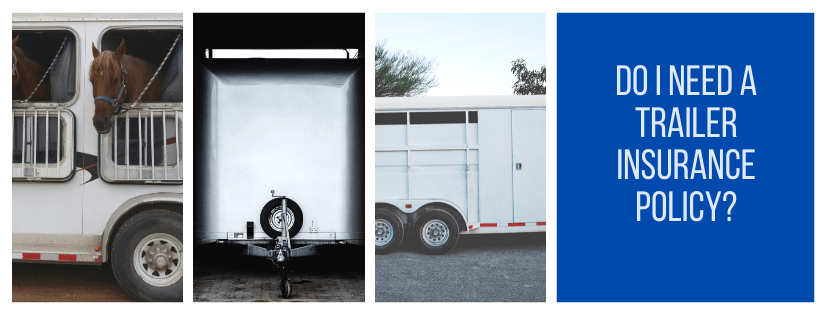For you to be best protected, it is always recommended that you carry a separate travel trailer insurance policy. Because of the countless situations that may occur with a trailer, it is not entirely possible to say that your auto insurance policy will provide liability protection if your trailer causes damages or personal injury.
Common Trailer Types Include:
- Conventional Trailer: The most common type of travel trailer between 12-40 feet.
- Fifth Wheel Trailer: Attached to a vehicle using a hitch in the bed of the tow vehicle.
- Pop-up Tent Trailer: Collapsible trailer used for camping & recreation.
- Truck Camper: Mounted in the bed of the truck with an over-cab area for sleeping.
- Horse Trailer: Trailer used primarily to haul horses.
- Toy Hauler: An RV type trailer with living space as well as the ability to haul ATVs or Motorcycles.
- Cargo or Utility Trailers: Small trailers used for moving or landscape jobs odd jobs.
Do I need insurance on my trailer?
The rule of thumb for trailers, that are used for personal use, is that the liability follows whatever vehicle it is towing the trailer (up to a certain size). As long as the trailer is hitched to a covered vehicle, the liability from that vehicle will extend to the trailer. But don’t assume so! You should check with your insurance agent before hitting the road.
After verifying your personal auto policy does cover your trailer, it may only provide liability coverage. When hauling a trailer, the liability coverage from the vehicle extends over to the trailer in case any damage is caused while being towed. In this scenario, the coverage from your vehicle extends over to the trailer. This will not cover the physical damage to the trailer, however. This is why we recommend two options: Add physical damage coverage to the trailer on your auto policy or purchase an additional recreational vehicle policy. This is how you will receive the coverage needed to repair the damage to your trailer.
There are two additional considerations before hitching up.
First, if the trailer is sitting on blocks not hooked up, and it rolls and hits something unless the trailer is specifically scheduled there is no liability coverage. If you plan on leaving your trailer unhitched at job sites or in the driveway, its best to carry additional coverage. This will protect your asset when not connected to your vehicle, and therefore not covered by your personal auto policy.
Second is if you own the trailer outright or if it still carries a loan. Check with your bank to see if they require trailer insurance and the requirements of the loan to make sure you are in compliance. If you’re unsure, check with one of our agents and we’ll be happy to help you determine what is necessary.
How does my Recreational Vehicle insurance policy for my trailer work? What does it cover?
Adding a recreational vehicle policy to your trailer will cover the physical damage to the trailer itself. It provides both comprehensive and collision coverage for the trailer. In the event of an accident, the collision coverage will cover the damage to the trailer, which was caused by you. Comprehensive will protect you in case the trailer is stolen, contact with an animal, vandalized, or damaged in a storm or fire. This is different than coverage for the items in the trailer, which may require additional protection.
It is important to understand the difference between what your personal auto policy will cover and why an additional recreational vehicle trailer policy will help give you peace of mind. For example, one day you’re backing your trailer up in a parking lot and you accidentally collide with a parked car. Your personal auto policy will cover the damage to the parked car, while the recreational vehicle travel trailer policy will repair your trailer.
Find more information
 Should I Have Collision & Comprehensive Insurance on My Auto Policy?
Should I Have Collision & Comprehensive Insurance on My Auto Policy?
When it comes to shopping for car insurance, there are many options for coverage. You could get the bare minimum for car insurance or you could have full coverage for your policy. Each state varies with what is required for minimum… Read more
What types of coverage should I have for my Recreational Trailer, Camper, or other trailers?
To obtain property coverage on a trailer, it must be specifically scheduled on a policy with the year, make, model, serial number, and/or the VIN number. It is usually recommended to have a separate recreational vehicle travel trailer insurance policy to avoid any gaps in insurance coverage. Some common options include:
- Comprehensive Coverage: Can provide coverage for your trailer if it catches on fire, theft, is vandalized, contact with an animal, falling object or damaged by severe weather.
- Collision Coverage: Can provide coverage if your trailer is damaged by you while being towed, or while unattended and parked.
- Liability Insurance: Can provide coverage for injuries or property damage caused by you to another party. Many companies will have “liability follows the tow vehicle” for trailers since trailers can’t drive themselves.
- Optional coverages to discuss with your agent include:
- Roadside Assistance
- Total Loss Replacement
- Replacement cost/personal effects
- Vacation Liability
- Full timer’s Liability
Exploring the country in a trailer or just going camping on the weekend can be great fun. Be sure that before you leave you to talk to your licensed insurance agent about insuring your trailer correctly to avoid any surprises.
Subscribe to our newsletter
Get these posts and other useful tidbits delivered right to your inbox. Our quarterly email is the best resource for keeping all the things that matter most protected.



